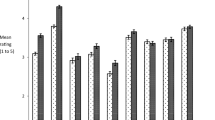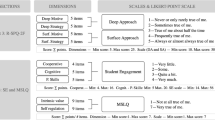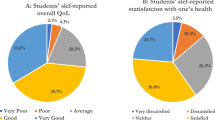Abstract
Issues linked with the notions of quality of life (QOL) and motivation to learn among Asian medical students have not been well documented. This is true in both the international and the New Zealand contexts. Our paper addresses this lack of research by focusing on the QOL of international and domestic Asian students studying in New Zealand, where Asian students form a significant proportion of tertiary students. Although there is evidence to suggest that Asian students do well academically, it was felt that an investigation into their QOL would be instructive as QOL will likely have an impact on cognition, behavior, general well-being, and motivation. The present study surveyed fourth- and fifth-year medical students to examine the relationship between QOL and motivation to learn and to consider how Asian medical students compare against European medical and non-medical student peers. The study utilized the World Health Organization—Quality of Life questionnaire (BREF version) and a shortened version of the Motivated Strategies for Learning Questionnaire. The results show that the Asian medical students in this study generated significantly lower scores in terms of their satisfaction with social relationships compared with their non-Asian peers. In addition, international Asian medical students appear to be more at risk than domestic Asian students with respect to test anxiety. The paper considers the findings and the implications for quality of life, motivation to learn, medical education, and the Asian student community.
Similar content being viewed by others
References
Akins, R. B. (2007). Motivation of Asian Americans to study medicine: a pilot study. Academic Leadership, 5(1), Retrieved August 4, 2009. From http://www.academicleadership.org/emprical_research/Motivation_of_Asian_Americans_to_Study_Medicine_A_Pilot_Study.shtml.
Azer, S. A. (2009). Interactions between students and tutor in problem-based learning: the significance of deep learning. Kaohsiung Journal of Medical Science, 25, 240–249. doi:10.1016/S1607-551X(09)70068-3.
Diener, E., Suh, E. M., Smith, H., & Shao, L. (1995). National cultural differences in reported subjective well-being: why do they occur? Social Indicators Research, 34(1), 7–32.
Dundes, L., Cho, E., & Kwak, S. (2009). The duty to succeed: honor versus happiness in college and career choices of East Asian students in the United States. Pastoral care in education, 27(2), 135–156. doi:10.1080/02643940902898960.
Fitzjohn, J., Wilkinson, T., Gill, D., & Mulder, R. (2003). The demographic characteristics of New Zealand medical students: The New Zealand Wellbeing, Intentions, Debt and Experiences (WIDE) Survey of Medical Students 2001 study. Journal of the New Zealand Medical Association, 116 (1183), http://www.nzma.org.nz/journal/116-1183/1626/.
Glass, G., & Hopkins, K. (1996). Statistical methods in education and psychology. Boston: Allyn & Bacon.
Group, W. H. O. Q. O. L.-. (1998). Development of the World Health Organization WHOQOL-BREF quality of life assessment. Psychological Medicine, 28(3), 551–558.
Gupchup, G. V., Borrego, M. E., & Konduri, N. (2004). The impact of student life stress on health related quality of life among doctor of pharmacy students. College Student Journal, 38(2), 292–301.
Healey, N. M. (2008). Is higher education in really ‘internationalising’? Higher Education, 55, 333–355.
Heine, S. J., & Hamamura, T. (2007). In search of East Asian self-enhancement. Personality and Social Psychology Review, 11(1), 4–27. doi:10.1177/1088868306294587.
Henning, M. A. (2007). Students’ motivation to learn, academic achievement, and academic advising. AUT University, Auckland: Doctor of Philosophy PhD.
Ho, E., Au, S., Bedford, C., & Cooper, J. (2002). Mental health issues for Asians in New Zealand: A literature review. Retrieved September 2, 2009. From http://www.waikato.ac.nz/wfass/migration/docs/mhc-mhi-for-asians.pdf.
Holmes, P. (2005). Ethnic Chinese students’ communication with cultural others in a New Zealand university. Communication Education, 54(4), 289–311. doi:10.1080/03634520500442160.
Hsu, P. H.-C., Krägeloh, C. U., Shepherd, D., & Billington, R. (2009). Religion/spirituality and quality of life of international tertiary students in New Zealand: an exploratory study. Mental Health, Religion & Culture, 12(4), 385–399. doi:10.1080/13674670902752920.
Kanagawa, C., Cross, S. E., & Markus, H. R. (2001). “Who Am I?” the cultural psychology of the conceptual self. Personality and Social Psychology Bulletin, 27(1), 90–103. doi:10.1177/0146167201271008.
Kember, D. (2000a). Misconceptions about the learning approaches, motivation and study practices of Asian students. Higher Education, 40(1), 99–121. doi:10.1023/A:1004036826490.
Kember, D. (2000b). Misconceptions about the learning approaches motivation and study practices of Asian students. Higher Education, 40(1), 99–121.
Leung, F. K. S. (2002). Behind the high achievement of East Asian Students. Educational Research and Evaluation, 8(1), 87–108. doi:10.1076/edre.8.1.87.6920.
Lewis, A., Krägeloh, C. U., & Shepherd, D. (2009). Pet ownership, attachment and health-rated quality of life in New Zealand. Electronic Journal of Applied Psychology: General Articles, 5(1), 96–101.
Markus, H., & Kitayama, S. (1991). Culture and the self: implications for cognition, emotion, and motivation. Psychological Review, 98(2), 224–253.
Ministry of Education. (2009). Key indicators for export education levy. Retrieved December 8, 2009. From http://www.educationcounts.govt.nz/statistics/international_education.
Mitmansgruber, H., Becka, T. N., Höfera, S., & Schüßlera, G. (2009). When you don’t like what you feel: experiential avoidance, mindfulness and meta-emotion in emotion regulation. Personality and Individual Differences, 46(4), 448–453.
Murphy, B., Herrman, H., Hawthorne, G., Pinzone, T., & Evert, H. (2000). Australian WHOQOL Instruments: User’s manual and interpretation guide. Melbourne: Australian WHOQOL Field Study Centre.
Ng, C.-H. (2003). Re-conceptualizing achievement goals from a cultural perspective. Auckland, New Zealand: Paper presented at the Joint Conference of NZARE & AARE.
Perrott, A. (2003). Foreign students huge industry for city. New Zealand Herald, 7 May, p. A5.
Pintrich, P. R., & De Groot, E. V. (1990). Motivational and self-regulated learning components of classroom academic performance. Journal of Educational Psychology, 82(1), 33–40. doi:10.1037/0022-0663.82.1.33.
Robotham, D., & Julian, C. (2006). Stress and the higher education student: a critical review of the literature. Journal of Further and Higher Education, 30(2), 107–117.
Rosenthal, J. M., & Okie, S. (2005). White coat, mood indigo: depression in medical school. New England Journal of Medicine, 353(11), 1085–1088.
Ross, S., Cleland, J., & Macleod, M. J. (2006). Stress, debt and undergraduate medical student performance. Medical Education, 40(6), 584–589.
Sam, D. L. (2001). Satisfaction with life among international students: an exploratory study. Social Indicators Research, 53(3), 315–337. doi:10.1023/A:1007108614571.
Scott, D. (2002). Retention, completion and progression in tertiary education in New Zealand. Journal of Higher Education Policy and Management, 27(1), 3–17. doi:10.1080/13600800500045687.
Srivastava, K., Raju, M., Saldanha, D., Chaudhury, S., Basannar, D., Pawar, A., et al. (2007). Psychological well-being of medical students. Medical Journal Armed Forces of India, 63(2), 137–140.
Statistics New Zealand. (2006). Culture and identity: Ethnic group Retrieved June 3, 2009 from 2006 Census from the Statistics New Zealand database: http://www.stats.govt.nz/products-and-services/table-builder/2006-census-tables/culture-identity-ethnic-group.htm.
The University of Auckland. (2009a). Estimated annual tuition fees for international students Retrieved August 5, 2009, from http://www.auckland.ac.nz/uoa/is-estimated-annual-tuition-fees-for-international-students.
The University of Auckland. (2009b). Tuition fees Retrieved August 5, 2009. From http://www.auckland.ac.nz/uoa/fu-tuition-fees.
Ward, C., & Masgoret, A.-M. (2004). The experiences of international students in New Zealand: Report on the results of the national survey. Retrieved January 21, 2011, from http://www.educationcounts.govt.nz/publications/international/14700.
Yi, J., Lin, J., & Kishimoto, Y. (2003). Utilization of counseling services by international students. Journal of Instructional Psychology, 30(4), 333–343.
Acknowledgments
We would like to thank Johanna Beattie, Melinda Smith, the Centre for Medical and Health Sciences Education and the fourth- and fifth-year medical students for their considerable assistance in the collection of data and access to the necessary resources to complete this work.
Author information
Authors and Affiliations
Corresponding author
Rights and permissions
About this article
Cite this article
Henning, M.A., Hawken, S.J., Krägeloh, C. et al. Asian medical students: quality of life and motivation to learn. Asia Pacific Educ. Rev. 12, 437–445 (2011). https://doi.org/10.1007/s12564-011-9148-y
Received:
Revised:
Accepted:
Published:
Issue Date:
DOI: https://doi.org/10.1007/s12564-011-9148-y




